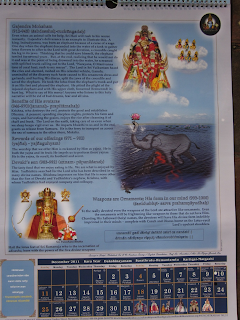My favourite part of "Rahasya Ratnavali Hrudayam".
One jiva or atma is not the protector of another jiva
1. One jiva or atma is not the protector of another jiva. This means that among the chetanas souls, who are all subservient, no one can be the independent protector either of himself or of others. ("Shandilya-Smriti", 1.15)
The same idea is expressed in the following texts:
2. "A dehi (or soul) is by himself like a ball of clay and is subservient (to another). When he is incapable of saving even himself, how can he be the protector of another?" ("Bharatam Shanti Parva", 294-16)
3. "The enlightened do not worship Brahma, Rudra, and other gods spoken of in the Sastras, since the fruit (that can be had from them) is only limited (trifling)." ("Bharatam Shanti Parva", 350-36)
"Brahma, Rudra and all the other hosts of gods are impure as they are devoid of the knowledge that nothing except the Lord is worth our attention. They stand condemned because of the feeling that they are independent (while they are not so)."
"O Best of men, All others who are objects of thoughts of the mind are impure; because, all of them - gods and the like - have their origin in Karma (have birth and death due to Karma)."
4. "All the living beings beginning with Brahma and ending with the tiny grass, that are situated in this world are under the control of Samsara (world) which originates from Karma." ("Shree Vishnu-Dharma", 104.23.25)
5. "For this reason those gods are of no use in meditation for those that wish to meditate. They are themselves immersed in Avidya (Nescience) and are in the grip of Samsara.' ("Shree Vishnu-Dharma")
"They may become possessed of knowledge later on. Since knowledge is not innate in them and since it comes to them also from others, they are of no use in meditation,"
6. "All beings have been bound with strings by the Paramatma for His own sport. They are to be released ONLY by Him and others cannot set them free." ("Shree Vishnu-Dharma")
Sriman Narayana is the only One Who is the Protector of all jivas.
7. To explain:
"Lord of Sri (Shreemati Lakshmi-Devi)! Narayana! Master! I have no other means (of saving myself); I seek refuge at Thy Two Feet I am Thine alone, Achyuta!"
8. "They, who seek refuge in me, cross The Maya, Prakriti" ("Shree Bhagavad-Gita", 7.14)
9. "One should seek Refuge in that Primeval Parama Purusha from Whom all the activities (of the world) from ancient times have emanated." ("Shree Bhagavad-Gita", 15.14)
10. "O Arjuna! Seek Refuge in Him alone in every way and by all means. By His Grace you will get supreme tranquility and the ever-existing place." ("Shree Bhagavad-Gita", 18.62)
11. "To those who are immersed in the sea of samsara and whose minds are overcome by the objects of senses, there is no other source of relief except the boat in the form of Bhagavan Shree Vishnu." ("Shree Vishnu-Dharma", 1.5.9)
12. "Wise men seek refuge in Thee alone and thereby cross the frightful sea of samsara which is the receptacle of endless misery."
13. "Place me at once before Rama Who is the Protector of all worlds and Who is Sublime by Nature." ("Ramayana-Yuddha")
As stated in these Texts with reference to all the jivas, whether they have any equipment or bereft of all help, Bhagavan Shree Narayana Alone brings about the removal of disagreeable things and the attainment of desires; Bhagavan Shree Narayana - Who is possessed of The Consort (Shreemati Lakshmi-Devi) of a form, of a unique relationship (with us) and of specific qualities.
And He does it without seeking help from any other source excepting the auxiliaries that are subject to and dependent on His Will.
No one can do any harm to those who have taken resort to Narayana; and no one else can save those who have sinned against (or offended) the Lord and thereby become objects of dislike to Him, Who by Nature, is equal (or impartial) towards all and Who says,
This can be understood from the stories of Prahlada, Sumukha, the Crow, Ravana etc. and in the purport of the following two slokas:
16. "When The Beautiful-Faced Sita sees an elephant or a lion or a tiger (in the forest), She does not get frightened as She has taken Refuge to The Two Arms of Bhagavan Shree Rama." ("Shree Ramayana", Ayodhya, 60.20)
17. "Brahma, who is self-born and four-faced, or Indra, who has the title of Mahendra and is the chief of all gods, or Rudra who is three-eyed and is the destroyer of the three cities (of gold, silver and iron), - none of them is capable of saving him whom Rama has resolved to slay in a battle." ("Shree Ramayana", Ayodhya, 51.45)



















